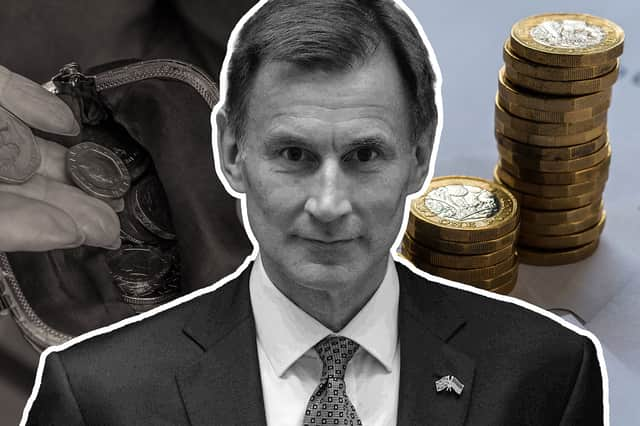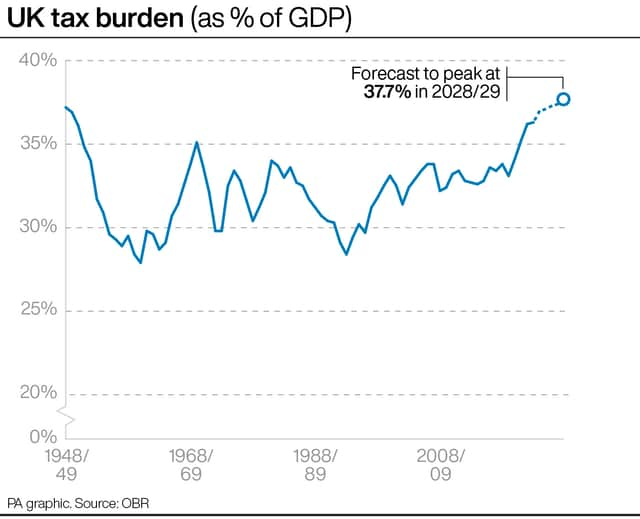Autumn Statement 2023: Jeremy Hunt promises cuts but Tory stealth tax will still hit millions
and live on Freeview channel 276
“We are delivering the biggest business tax cut in modern British history,” Jeremy Hunt crowed to the Commons. “The largest ever cut to employee and self-employed national insurance and the biggest package of tax cuts to be implemented since the 1980s.”
I thought Liz Truss did that last year, although I suppose the Chancellor cancelled all of her and Kwasi Kwarteng’s tax cuts. Looking down from my position high up in the House of Commons, it was pretty obvious how Hunt was trying to position his Autumn Statement with an election round the corner. The economy is back on track, the Conservatives cut taxes and Labour spend big. With David Cameron back in government it was all feeling very 2013, not 2023.
Advertisement
Hide AdAdvertisement
Hide AdAfter watching the Chancellor for around an hour, most people would assume their tax bill will go down - given the amount of times he mentioned tax cuts. However, despite all of Hunt’s proclamations, that may not be the case for a lot of us. In the short term, for the average worker the national insurance cut will save around £450 in a year.
But the government chose not to reduce income tax, or change the thresholds, and that will have a huge impact on people’s tax bills. Over the last few years, inflation has skyrocketed and that has pushed wages up (albeit at a lower rate). That has then pushed people into higher tax bands - for example from the tax-free allowance into the 20% rate, and from there into the higher and top rates.


So despite the Chancellor’s promises about how the Tories are cutting taxes, the tax burden - compared to the size of the economy - is set to get bigger and bigger, and will soon be at its highest level since the end of the Second World War. Strangely I don’t think the Conservatives will be putting this on a poster.
While the Office for Budget Responsibility, the government’s independent economic watchdog, has worked out that the freezing of tax thresholds - known as “fiscal drag” - is set to raise £44.6 billion by 2028-29. This will force nearly four million more people to pay income tax and move three million more into the higher rate.
Advertisement
Hide AdAdvertisement
Hide AdWhen quizzed about this by journalists after Hunt’s Autumn Statement, Treasury officials were more up front than the Chancellor. They said the pandemic and the energy crisis were both hugely costly to the government, and that money has to be paid back somehow.


The problem is that’s not what their boss, Jeremy Hunt, is telling the country in the Commons. Britons may be expecting their tax bill to go down, but as Sam Robinson, from the Social Market Foundation, explained the “cuts to National Insurance rates barely touch the sides of the tax increase from frozen thresholds meaning they aren’t really a ‘cut’ at all for many households”.
On top of that the IPPR think tank has calculated that the cuts largely benefit the best-off households, and particularly help those in London and the South East.
Despite all the calculations, estimations and economic science behind the Autumn Statement, it’s still a political event. There’s still spin, bluff and bluster. Hunt may be crowing about cuts, but the Tories’ stealth tax increase will still hit millions in their pockets.
Advertisement
Hide AdAdvertisement
Hide AdThe problem is that after years of real-terms rises, the public now associate the Conservatives with high taxes more than Labour. Will Hunt’s speech today be enough to change voters’ minds? We’ll find out at the next election.
Ralph Blackburn is NationalWorld’s politics editor based in Westminster, where he gets special access to Parliament, MPs and government briefings. If you liked this article you can follow Ralph on X (Twitter) here and sign up to his free weekly newsletter Politics Uncovered, which brings you the latest analysis and gossip from Westminster every Sunday morning.
Comment Guidelines
National World encourages reader discussion on our stories. User feedback, insights and back-and-forth exchanges add a rich layer of context to reporting. Please review our Community Guidelines before commenting.
